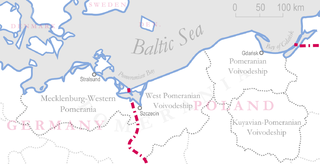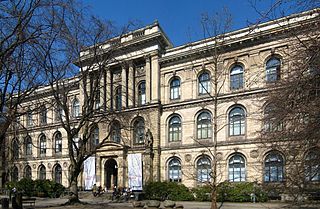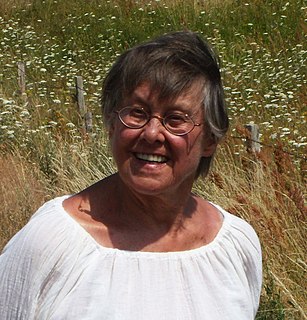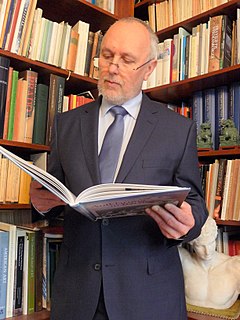The Pomerania euroregion or Euroregion Pomerania was set up in 1995 as one of the euroregions, thought to connect regions divided between states of the European Union. The name is taken from the region of Pomerania, yet the euroregion is of a different shape than the historical region. It comprises German Western Pomerania and Uckermark, as well as Polish Zachodniopomorskie.

Kołobrzeg, historically known in English as Kolberg, is a city in the West Pomeranian Voivodeship in north-western Poland with about 47,000 inhabitants. Kołobrzeg is located on the Parsęta River on the south coast of the Baltic Sea. It has been the capital of Kołobrzeg County in West Pomeranian Voivodship since 1999, and was in Koszalin Voivodship from 1950 to 1998.

Pomerania is a historical region on the southern shore of the Baltic Sea in Central Europe, split between Poland and Germany. The western part of Pomerania belongs to the German states of Mecklenburg-Western Pomerania and Brandenburg, while the eastern part belongs to the West Pomeranian and Pomeranian voivodeships of Poland. Its historical border in the west is the Mecklenburg-Western Pomeranian border valley, which now constitutes the border between the Mecklenburgian and Pomeranian part of Mecklenburg-Western Pomerania, while it is bounded by the Vistula River in the east. The easternmost sub-regions of Pomerania are alternatively known as Pomerelia and Kashubia, which are inhabited by ethnic Kashubians.

Szczecin is the capital and largest city of the West Pomeranian Voivodeship in northwestern Poland. Located near the Baltic Sea and the German border, it is a major seaport and Poland's seventh-largest city. As of December 2019, the population was 401,907.

The Natural History Museum is a natural history museum located in Berlin, Germany. It exhibits a vast range of specimens from various segments of natural history and in such domain it is one of three major museums in Germany alongside Naturmuseum Senckenberg in Frankfurt and Museum Koenig in Bonn.

Licht (Light), subtitled "Die sieben Tage der Woche", is a cycle of seven operas composed by Karlheinz Stockhausen between 1977 and 2003. The composer described the work as an "eternal spiral" because "there is neither end nor beginning to the week." Licht consists of 29 hours of music.

The Berlin-Brandenburg capital region is one of the most prolific centers of higher education and research in the world. It is the largest concentration of universities and colleges in Germany. The city has four public research universities and 27 private, professional and technical colleges (Hochschulen), offering a wide range of disciplines. Access to the German university system is tuition free.

The Dębczyn culture is an archeological culture in Pomerania from the 3rd to 6th centuries. It was derived from the neighboring Wielbark culture with influences from the Elbe region. The culture was superseded as the result of the later migrations of West Slavs, in particular of the Pomeranians.

After the glaciers of the Ice Age in the Early Stone Age withdrew from the area, which since about 1000 AD is called Pomerania, in what are now northern Germany and Poland, they left a tundra. First humans appeared, hunting reindeer in the summer. A climate change in 8000 BC allowed hunters and foragers of the Ertebølle-Ellerbek culture to continuously inhabit the area. These people became influenced by farmers of the Linear Pottery culture who settled in southern Pomerania. The hunters of the Ertebølle-Ellerbek culture became farmers of the Funnelbeaker culture in 3000 BC. The Havelland culture dominated in the Uckermark from 2500 to 2000 BC. In 2400 BC, the Corded Ware culture reached Pomerania and introduced the domestic horse. Both Linear Pottery and Corded Ware culture have been associated with Indo-Europeans. Except for Western Pomerania, the Funnelbeaker culture was replaced by the Globular Amphora culture a thousand years later.
The Gustow group is an archaeological culture of the Roman Iron Age in Western Pomerania. The Gustow group is associated with the Germanic tribe of the Rugii.
Hans Wolfgang Helck was a German Egyptologist, considered one of the most important Egyptologists of the 20th century. From 1956 until his retirement in 1979 he was a Professor at the University of Hamburg. He remained active after his retirement and together with Wolfhart Westendorf published the German Lexikon der Ägyptologie, completed in 1992. He published many books and articles on the history of Egyptian and Near Eastern culture. He was a member of the German Archaeological Institute and a corresponding member of the Göttingen Academy of Sciences.

The Siege of Stralsund was an armed engagement between the Electorate of Brandenburg and the Swedish Empire from 20 September to 15 October 1678, during the Scanian War. After two days of bombardment on 10 and 11 October, the severely devastated Swedish fortress of Stralsund surrendered to the Brandenburgers. The remainder of Swedish Pomerania was taken by the end of the year, yet most of the province including Stralsund was returned to Sweden by the terms of the Treaty of Saint-Germain-en-Laye and the Peace of Lund, both concluded in 1679.
Ingo Haar is a German historian. He received his Master of Arts from the University of Hamburg in 1993 and his PhD in History in 1998 at the Martin Luther University of Halle-Wittenberg. His doctoral dissertation was on "Historians in Nazi Germany: the German history and the`'Ethnic struggle' in the `East'".
Manfred Rühl is a German communication scientist with a social science background.
Wolfram Euler is a German historical linguist and Indo-Europeanist.

Jutta Frieda Luise Meischner is a German archeologist with specialities in philology, classical archaeology, ancient history with a doctorate on Classical Archaeology. In 1964, she entered the service of German Archaeological Institute, Berlin.

Helmut Müller-Enbergs is a German political scientist who has written extensively on the Stasi and related aspects of the German Democratic Republic's history.

Karl Reinisch was a German electrical engineer and professor for control engineering in Ilmenau. Under his lead, a solid foundation for automation and system technology for cybernetics was developed at the Technische Universität Ilmenau. For many years, he was active at the International Federation of Automatic Control (IFAC).
Hans-Jörg Rheinberger is an historian of science who comes from Liechtenstein. He was director of the Max Planck Institute for the History of Science in Berlin from 1997 to 2014. His focus areas within the history of science are the history and epistemology of the experiment, and further the history of molecular biology and protein biosynthesis. Additionally he writes and publicizes essays and poems.
Dirk Alvermann is a German historian and archivist.

Gerd-Helge Vogel is a German art historian.